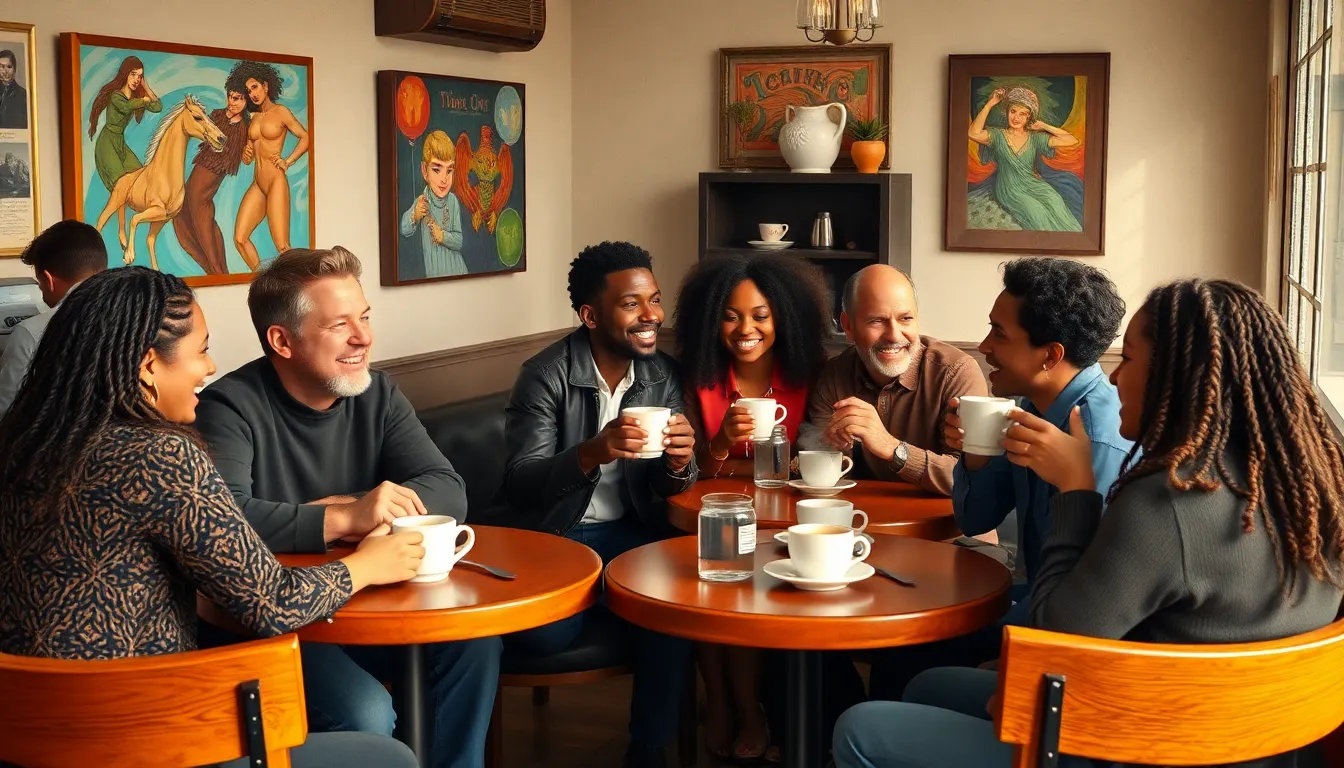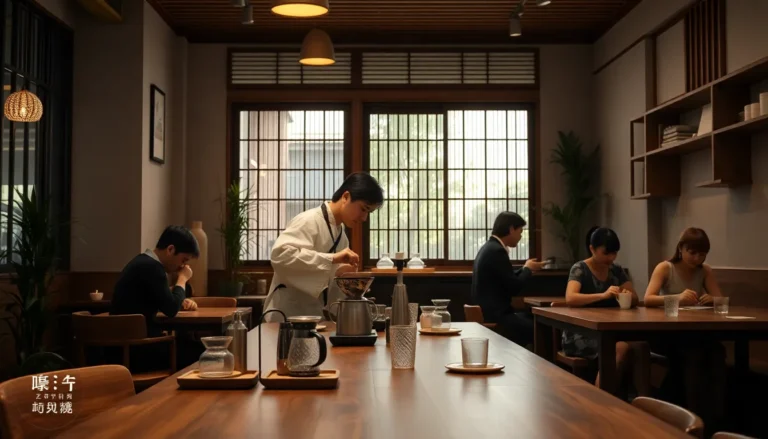Table of Contents
ToggleIn the bustling world of coffee shops, a rich brew of culture brews alongside every cup. It’s not just about caffeine; it’s about community, creativity, and the occasional existential crisis over a macchiato. From hipster havens to cozy corners, these spaces offer more than just a jolt of energy—they provide a stage for connections, ideas, and maybe even a few awkward first dates.
With the aroma of freshly ground beans filling the air, coffee shops have become the modern-day watering holes. Here, baristas are the new bartenders, and every latte art is a masterpiece waiting to be Instagrammed. Whether you’re a remote worker, a casual meet-up enthusiast, or just someone who enjoys eavesdropping on conversations, the coffee shop culture invites everyone in for a sip of inspiration and a dash of laughter. So grab your favorite mug and let’s dive into this delightful world where every cup tells a story.
Overview of Coffee Shop Culture
Coffee shops serve as essential community hubs, fostering environments where individuals connect. Relationships blossom over shared tables, while conversations flow freely among patrons. Creativity often thrives in these spaces, manifesting through live performances, art displays, and writing sessions. Many visitors come not just for caffeine but for the ambiance, transforming these shops into local gathering spots.
Baristas play a pivotal role in this culture, acting as both servers and conversationalists. They craft beverages with care, and their skill in latte art has gained significant recognition on platforms like Instagram. Engaging with customers elevates the experience, making each visit feel personalized.
Healthy competition among coffee shops fuels innovation. Many establishments offer unique brews, specialty drinks, and local pastries, aiming to stand out in a crowded market. Events such as coffee tastings and brewing workshops invite community participation, enhancing the appreciation for quality coffee.
Social interactions within coffee shops often extend beyond simple exchanges. Networking opportunities arise as professionals meet, collaborate, and establish connections. Students frequently gather to study, benefiting from the stimulating environment and access to Wi-Fi.
Cultural diversity enriches coffee shop experiences. Global influences can be seen in menu offerings, ranging from traditional coffees to specialized drinks that reflect various backgrounds. Dining spaces cater to all preferences, ensuring inclusivity and warmth.
Coffee shops encapsulate a blend of community, innovation, and cultural richness. Each visit tells a different story, inviting individuals to become part of a larger narrative that celebrates coffee, creativity, and connection.
Historical Evolution of Coffee Shops

Coffee shops have transformed over the centuries, reflecting cultural shifts and societal trends. Their evolution illustrates the growing importance of these spaces as social hubs.
Origin and Early Establishments
Coffee’s journey began in Ethiopia, where it was discovered in the 15th century. The first coffee shops emerged in the Ottoman Empire, with the first known establishment opening in Constantinople in 1554. These early coffee houses became social gathering spots, promoting conversation and commerce. Patrons engaged in discussions and shared ideas, fostering a sense of community. Similar venues spread across Europe by the 17th century, particularly in England and France, where they played a crucial role in the intellectual movements of the time.
Coffee Houses in the 20th Century
The 20th century marked a significant shift in coffee shop culture. During this era, establishments evolved to reflect regional trends and societal changes. American coffee houses emerged as popular venues for artists and intellectuals, particularly during the Beat Generation in the 1950s. These spaces became platforms for expression, often hosting poetry readings and music performances. In Europe, espresso bars gained prominence, focusing on rapid service and social interaction. As coffee became more accessible, diverse coffee preparations and brewing methods flourished, further cementing coffee shops as central to community life.
Social Dynamics in Coffee Shops
Coffee shops serve as vibrant community gathering places. They foster connections and conversations among diverse individuals. Friends meet over steaming cups, while strangers bond over shared tables. These environments encourage networking and the forging of relationships.
Community Gathering Spaces
Coffee shops create an inviting atmosphere for social interactions. They act as local hubs where residents gather for casual meetings and events. Open seating arrangements promote discussion among strangers and friends alike. Regular patrons develop camaraderie with baristas and fellow coffee lovers. Events like open mic nights or book clubs enhance the communal experience. Urban dwellers find solace in this shared space, cultivating a sense of belonging.
The Role of Coffee Shops in Urban Life
Coffee shops contribute significantly to the urban landscape. They provide not just caffeine but a backdrop for creativity and collaboration. Professionals often choose these spaces for remote work, boosting productivity in a lively environment. Coffee culture thrives on innovation, with unique blends and artisanal choices attracting locals. By hosting events, they also support local artists and entrepreneurs, enriching the community. As safe havens, coffee shops create a balance between hustle and relaxation in busy city life.
The Coffee Shop Experience
The coffee shop experience extends beyond just sipping beverages. Each visit immerses customers in an environment that encourages connection and creativity.
Atmosphere and Ambiance
Warm lighting often creates a welcoming atmosphere. Comfortable seating arrangements invite individuals to linger, whether for work or conversation. Sounds of coffee grinders and the chatter of patrons contribute to an energizing vibe. Decor often reflects local culture, showcasing art from community artists. This mix of sensory elements fosters a sense of belonging. Customers appreciate the chance to unwind or focus on tasks in these inviting spaces. Some coffee shops even incorporate plants, adding a refreshing touch to the overall ambiance.
Menu and Specialty Offerings
Diverse menus cater to various tastes and dietary preferences. Options include classic brewed coffee, artisanal espresso drinks, and unique seasonal beverages. Many coffee shops experiment with specialty offerings like nitrogen-infused brews or flavored cold brews. Vegan and gluten-free pastries often complement the drinks, ensuring inclusivity for all customers. Collaborations with local bakeries enhance the freshness and uniqueness of food options. Specialty drinks often gain popularity through social media, sparking interest and attracting new customers. Overall, these carefully curated menus elevate the coffee shop experience and foster customer loyalty.
Coffee Shop Trends
Coffee shops continuously evolve, reflecting changing tastes and lifestyles. Specialty coffee has surged in popularity in recent years.
The Rise of Specialty Coffee
Specialty coffee shops emphasize high-quality beans and unique brewing techniques. These establishments often source beans directly from farmers, establishing transparent relationships that benefit communities. Customers appreciate the artisanal approach and the meticulous attention to flavor profiles. Menu offerings frequently highlight single-origin coffees and innovative preparation methods, such as cold brew or nitro coffee. Baristas play a crucial role, often serving as educators about the origins and characteristics of the coffees they dispense. Both casual drinkers and enthusiasts enjoy participating in tastings and coffee education events. With the growth of social media, visually appealing beverages, like intricate latte art, attract new customers and elevate brand visibility.
Digital Nomad Life and Remote Work
Coffee shops function as essential workspaces for digital nomads and remote workers. Many professionals prefer the dynamic atmosphere over traditional offices. Free Wi-Fi and ample seating create an inviting environment for productivity. Patrons can enjoy caffeine-fueled creativity while working on projects or holding meetings. Community events and networking opportunities enhance collaboration among like-minded individuals. Group study sessions or brainstorming meetings often take place in these vibrant spaces. The transition to remote work has solidified coffee shops as modern work hubs, contributing significantly to their popularity.
Coffee shop culture thrives on the connections it fosters among individuals. These spaces are more than just venues for caffeine; they’re vibrant hubs where creativity and community converge. The atmosphere encourages interactions that can lead to friendships and collaborations, making every visit unique.
As coffee shops continue to evolve, they remain essential to urban life, reflecting diverse tastes and fostering local talent. Whether it’s through a perfectly crafted latte or an engaging event, each coffee shop tells its own story. Embracing this culture invites everyone to become part of a larger narrative, celebrating the rich tapestry of experiences that coffee brings to our lives.







